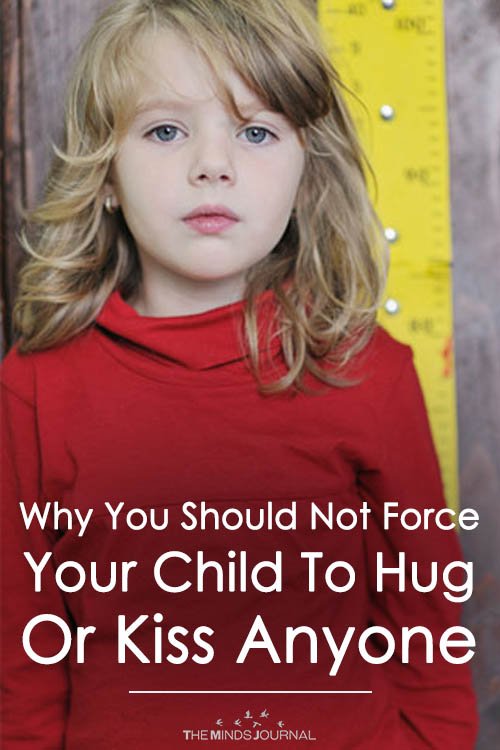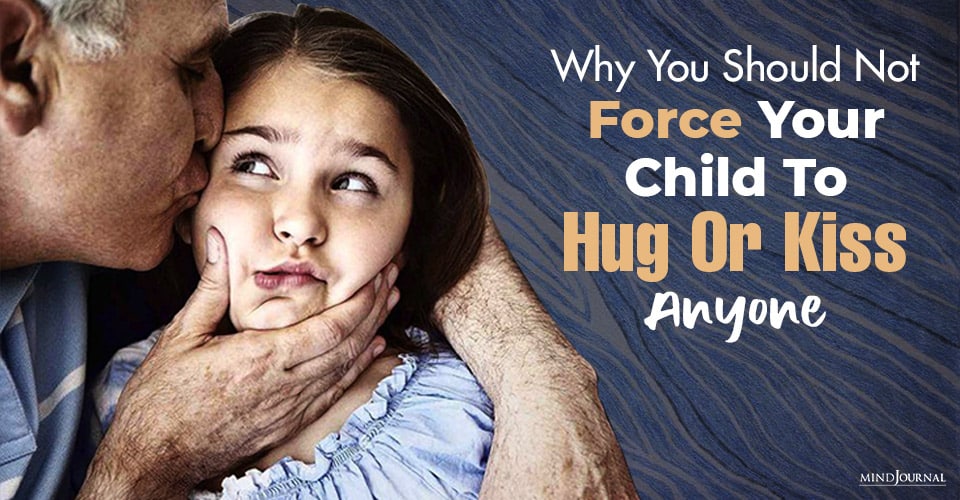Do you always ask your kids to hug or kiss anyone who visits your house even if they don’t want to? Or do you give them a choice?
Forcing your child to hug or kiss a family member may scar them for life!
Stop forcing and start teaching them about CONSENT.
Consent is crucial
It is crucial to teach your child about consent. You shouldn’t insist on them even if it is their grandma or grandpa who wants to hug, kiss or pick them up. Why?
According to mental health experts, you should always make a child feel comfortable and secure, even if doing so upsets you and other family members.
Some parents insist on their kids even if they don’t want to, because they lack awareness of the possible negative outcomes associated with it. Today, consent and bodily autonomy have become a big buzz. Thanks to the digital world and virtual connections, every small and big concern comes into the limelight.
More people are coming forward to share their personal life experiences and how we need to give children agency over their own bodies even if it means turning down hugs and love gestures from close ones.
Read Child Sexual Abuse: 5 Reasons Why You Should Reveal It
A meme shared by – A Mighty Girl (a parenting site for daughters) from Safe Kids, Thriving Families, a child abuse protection charity- went viral. The caption “I am 5. My body is my body” speaks volumes. “Don’t force me to kiss or hug. I am learning about consent and your support on this will help me keep myself safe for the rest of my life.”
The meme explains the hidden meaning behind the traditional family greetings. It highlights not to force kids to hug or kiss friends and folks. Telling your child to respond to physical affection shown by family members sends a damaging message about consent. A relative with perverted intentions can take utmost advantage, which can damage your child’s wellbeing. Because kids will grow up learning that their bodies don’t really belong to them. and will develop the habit of ignoring their feelings or develop a wrong perception of what is right and wrong.
“This leads to children getting sexually abused, teen girls submitting to sexual behavior so ‘he’ll like me’ and kids enduring bullying because everyone is ‘having fun” told Irene van der Zande (an expert on personal safety and violence prevention) to CNN.
Read Woman Explains Difference Between Rape And Consent To Men Who Still Don’t Get It
On the other hand, teaching children about consent and ownership of their bodies will prevent them from submitting to unwanted affection by near and dear ones in order not to upset a relative or disappoint a friend.
The CNN piece by CNN piece by Katia Hetter suggests parents to help children to learn to say no. Katia explains the directive she gave her own daughter telling her, “I would like you to hug Grandma, but I won’t make you do it.”
You might wonder what’s wrong with hugging a grandma or grandpa. Yes, it is wrong, if it is happening against your child’s wish.
Hetter says, “She doesn’t have to hug or kiss anyone just because I say so, not even me. I will not override my own child’s currently strong instincts to back off from touching someone she chooses not to touch. I figure her body is actually hers, not mine.”
Although it seems obvious, there are many parents forcing kids to be affectionate towards anyone and everyone. Sure, we all love kisses and hugs and kids too love giving them. But the point is – “what sends the wrong message.”
Parents must value and regard the feelings of their children on this subject.
The next time you organize a big family get-together, keep an eye on your kids. Take immediate action when they feel anxious or feel uncomfortable or hesitate as approached by a stranger or a distant relative. Protect your children if they say – “I simply didn’t want to be touched.”
Don’t pester them to explain the reason for their discomfort. Because they are too young to be able to articulate why they hate physical affection. You need to honor it in order to make good on our lessons of consent.
Consent is a good habit that when developed in the early years of life will keep children safer for the rest of their lives.
How can you explain kids that their bodies are their own?
Make sure it’s up to them every time — no exceptions! You have to give your child the freedom of choice. Let them decide who touches them and when without being impolite and disrespectful.
If they don’t like kisses, you can give them alternate options like hugs or high-fives,s or handshakes. Educate them to be polite be it, friends or strangers. Tell them that pleasing someone else should never rank higher than their own gut feeling “no don’t touch me”. Even if their grandma wants to hug them, never force them.
Read 6 Strategies to Help You Teach Your Child About Consent
Also, tell your child that there is nothing to feel guilty about when they decline physical affection. It’s not a punishable crime.
On doing so your children will grow up into an adult who knows how to maintain their sexual boundaries and make healthy choices about sex. They won’t end up sexually intimate with someone just to make them happy or get carried away with lovely requests.
I’m sure a lot of us grew up with dark memories of childhood but never spoke about it. Maybe, our parents never gave a thought about the other side of hugs and friendly touches. But, today the world has changed a lot. We are more aware than our parents. Let’s not push our kids into the same mental stress caused by unwanted love and physical touch.
I hope it’s clear to you now why you should not force your child to hug or kiss anyone. By teaching them about consent you are giving them tools now to make healthy decisions about their bodies and relationships in the long run and prevent a breach of privacy..
Are you ready to teach your child about consent?
Leave your thoughts and opinions in the comments below.










Leave a Reply